CHARGES against him were eventually dropped, but more than a decade after making the biggest mistake of his life, Bryan Green is still trying to escape his past.
“For that two-year period while the trials were going on I couldn’t work properly, I couldn’t think straight,” Green, 59, says. “But it was the aftermath that I guess was the toughest period. I came to understand how debilitating anxiety is. Feeling anxious when you go to bed, sweating all night and waking. I bruised myself because I was holding onto my arms that tight at night and I didn’t realise.”
Green is an avid fly-fisherman, pigeon fancier and hunter, but it was archery that pulled him back from the abyss, paving the way for his unlikely comeback from accused criminal to deputy premier and now leader of the Labor opposition.
He knows a bloke with a small farm in the Southern Midlands and would go there for hours on end to practise his new hobby. “I bought a bow and I practised,” he says. “I learnt about arrows and velocities. I’d spend hours practising and it would clear my mind.”
It was February 16, 2006, when Green made what he considers the biggest mistake of his life. Then deputy premier, he signed a deal granting a lucrative three-year monopoly to a builder accreditation company, Tasmanian Compliance Corporation, headed by former Labor minister John White. Green was accused, in signing the deal, of knowingly fettering a future infrastructure minister’s ability to properly exercise their powers and duties. Twice he faced trial on the charge of attempting to interfere with an executive officer, which attracts a maximum penalty of 21 years in jail. But the case was complicated and neither the first nor the second jury could decide on his guilt or innocence. After his second trial ended, in March 2008, prosecutors dropped the charges, allowing Green to resume his seat in parliament.
Two years later he was re-elected, having once again topped the poll in his North-West seat of Braddon. However, despite this apparent vindication by voters at both the 2010 and 2014 elections, Green admits his image is tainted by his distant courtroom ordeal.
Exclusive polling for the Mercury shows Tasmanians would prefer three of Green’s parliamentary Labor colleagues to lead the party. Rebecca White (on maternity leave) is the favourite, followed by Scott Bacon (considered by many within the party to be “not ready” to lead). Even former premier Lara Giddings (who is under pressure to reveal when she plans to leave politics) is more popular than Green, but only just.
MORE: WHITE FAVOURED TO LEAD LABOR
Although few Tasmanians could recall the details of Green’s criminal trials, the persistent “air of dodginess”, as one Labor member calls it (not helped by the fact Green lost his licence for three months for drink-driving in 2011), is one of the party’s biggest hurdles.
“I made a mistake, without a doubt, in signing that document,” Green says. “But my view at the time, despite what everyone suggests, was to have enough power to get rid of the TCC, not the other way around.”
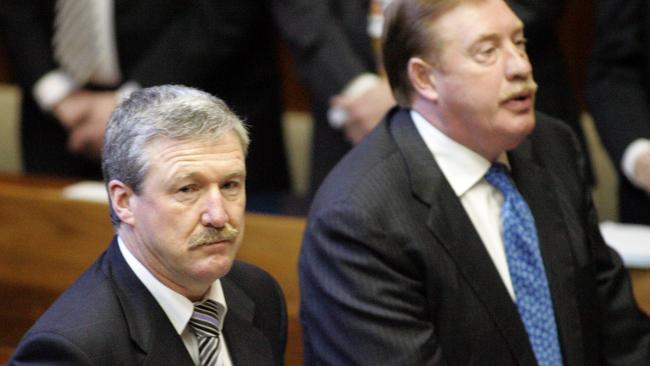
Green insists his chief concern in negotiating with the underperforming TCC, which had taken over from the government as the accreditor of builders in the state, was getting access to the company’s databases.
“The TCC owned all of the intellectual property associated with all the builders and building professionals in Tasmania,” Green says. “If we sacked them they could have packed their bags, their disks and their hard drives and moved on, and we would have been back to square one when it came back to builder compliance and architects and so on.”
His error was accepting the exclusivity clause the TCC was seeking, a deal one of his staffers warned looked like a mates’ deal. “You would assume I would be told at some stage that if I gave that exclusivity I would be contravening the Building Act and that would be illegal,” Green says. “I hadn’t understood that. I was told that what we needed to do was get that information back if we were to effectively get rid of them into the future. Those negotiations started on the basis of getting back that intellectual property.”
When asked, one of the prosecutors involved in the case does not take great issue with the Labor leader’s version of events. However, the question remains: even if voters are satisfied Green had no criminal intent, will they forgive his poor judgment enough to install him as premier?
“I’m a fitter by trade. I’ve got common sense but I don’t know the law inside out,” Green says. “I learnt my lesson. I made a mistake and I would never fall for the same trap again, never. I would never sign anything unless I was completely confident it didn’t contravene any act.”
He says his two trials taught him the value of “complete honesty” as opposed to the typical politician version of honesty. “It’s made me a much better person and a much better politician, I can tell you,” he says. “When I was asked questions about it in parliament I should have just been really direct about it. But instead I sort of tried to skirt around it, like politicians do. I shouldn’t have done that.”
As Green strolls down the main street of Queenstown, in Tasmania’s West, he looks and acts like a new man. The moustache he sported for most of his political career is long gone and he has the giddy aura of a man desperately in love, having married his second wife Ange on federal election day in July. His 34-year marriage to his first wife, Mary, fell apart after his criminal case ended.
MORE: GREEN’S WINNING COALITION
There is no one around as Green heads to the Empire Hotel for an interview with TasWeekend, no one to congratulate him for bringing 200 or so thirsty Labor party delegates to town for the party’s annual state conference. The streets are virtually empty, the other party members still holed-up in the local hall, debating motions on everything from sex workers and drugs to national school testing. In the main street, the Hunter’s Hotel is closed, awaiting a transformation into a bed and breakfast. A few cafes are open but the tourists who were here this morning seem to have left, possibly for day trips around the region. There is a peaceful silence now that the Mt Lyell copper mine has closed, its constant hum no longer the town’s backing track. According to mayor Phil Vickers, Queenstown’s population now hovers between 1000 and 2000, less than a third of what it once was.
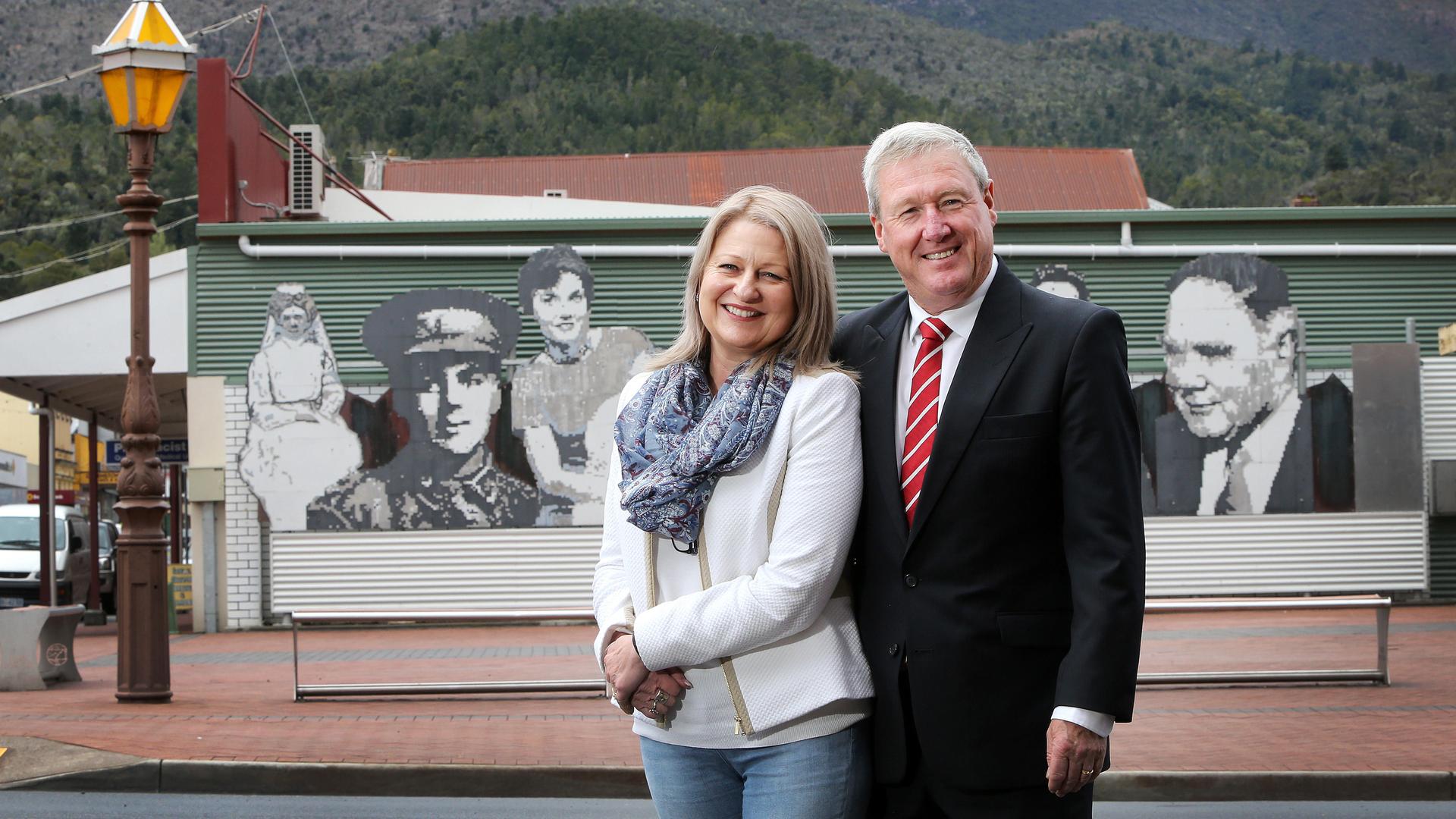
At least in the Empire’s front bar Green is greeted warmly by the only mid-afternoon customers, a pair of women playing Keno. As he chats to them before heading to the dining room for our interview, Green slips briefly into an ocker vernacular.
He hopes his decision to hold Labor’s conference at Queenstown will earn the party some “good karma”. Some conference delegates, however, say the feel-good move is not enough to dispel disquiet over Green’s commitment to the region since he moved to Mt Stuart with Ange, who works in Hobart.
The term that keeps popping up is “damaged goods”. Among the so-called party faithful, including the union-linked kingmakers of the Labor movement, there is concern that Green’s blemished past and his new life in Hobart could undermine the momentum that saw federal Labor pick up three key seats, including Braddon, in July. In the state seat of Braddon, Green’s fellow sitting members are Liberals Jeremy Rockliff, Adam Brooks, Joan Rylah and Roger Jaensch. The latter two will be key targets for Labor at the 2018 state election.
“We’ve got a really good chance of winning back at least two seats in Braddon,” Health and Community Sector Union state secretary Tim Jacobson says. “Those issues like healthcare that allowed us to pick up those seats federally still remain in place. But we stand a chance of not winning those seats if we don’t have a very, very strong presence up there in Braddon.”
Green is unapologetic about his new life, but insists he is as committed to Braddon as when he lived in the electorate. “Yes, my wife and I live in Hobart in the main,” he says. “I have rented accommodation on the North-West Coast and I’m there just about every week, just as I was in the past.
“I have had some people say to me, ‘Oh, you don’t live here anymore’, and I run the same argument. I live here in Braddon while I’m in Braddon, but if I do get a night off I spend it with my wife at home. I hope they would understand that having a personal life and a public life has to have some balance to it if you’re to remain focused on your job.”
Down the road at Serenade Cafe, where the chef Steve makes a mean burger, the debate is not about whether Green would make a good premier, but whether gay couples should be allowed to marry. Steve, a Liberal member and fan of local MP Brooks, supports the status quo. His friend, also helpfully named Steve, who runs an accommodation business in town, wants equal rights for all. The friendly argument rolls on.
Ange is in town to hear Green’s speech the next day. She is the manager of the Government’s Road Safety Advisory Council and also an artist. She says the Green portrayed in the media is not the funny and humble man she knows.
“Some people who come to power see it as a right,” she says. “In my view, sometimes it comes too easily. I know Bryan still pinches himself that he is in the role he is in.”
Tears spring easily to Green’s eyes as he reflects on a happy, roaming childhood at George Town, when his father Brian was a superintendent at Bell Bay. His younger brother died of cancer two years ago and the vivid memory of the family packing up the car to move to Burnie causes Green a moment of grief. “I must be getting old,” he mutters as he wipes away tears. He worries I will portray him as a “blubbering mess”.
I could be lying up a coal tunnel as I used to on a conveyor belt, or I could be in parliament talking about things I’m passionate about. I much prefer the latter - State Labor leader Bryan Green
After high school at Burnie, at 16, Green became an apprentice fitter and machinist at the local paper mill. At “The Pulp”, as it was known, Bryan Green the trade unionist was born.
“It wasn’t until I started working at The Pulp that I came to understand all of the issues associated with a fair day’s work for a fair day’s pay and things like health and safety,” he says. “I read in the union journal about asbestos and we were surrounded by the stuff. I raised the issue and we had to effectively go on strike to get proper face masks and so on because they just weren’t going to provide it. Nobody really believed it was a big issue at the time.”
He also objected to the divide between staff engineers, who were granted generous superannuation and retirement packages, and the tradies on the workshop floor who missed out. “It was those sorts of inequities that I saw as being important. We were the first industry outside the oil industry to get super,” he says.
Green reveals he is almost completely blind in one eye, which inhibits his ability to read aloud, an inconvenient problem for a man whose jobs involves rather a lot of reading aloud – in parliament, at press conferences and at the Labor conference, where he says he will “probably cock up” his speech.
“I’m in the worst possible job,” Green jokes. “I can see the words on the page but I can’t make them come out of my mouth sometimes – it’s very difficult. I was that kid at school, when they said, ‘Righto, Bryan, your turn to read out a paragraph’, I’d be, ‘Err, err, um, ah’.” He also describes himself as “barely computer literate”, although he can handle basics such as email.
Green rose to prominence during the bitter pulp dispute of 1992, when workers went on strike over company plans to abolish over-award payments and conditions. “That was a testing time for the whole Burnie community,” he says. “Some people wanted to go back to work, but obviously we had the place picketed. We had satellite discs from all over the country, it was a massive dispute and it became national headlines every day.
“In the end, we won but we lost. We won the right to come back to work, because we had all been sacked. Some of the conditions changed, but not all. We fought the good fight and we were able to walk back through those gates with our heads held high.
“And then they made the crazy decision to shut down the pulp mill and import pulp. It was a bit like importing coal into Newcastle. We were exporting woodchips and importing pulp. It was just really crazy and eroded the whole argument about cutting down trees because we were essentially getting rid of our biggest downstream processor in the Burnie mill.”
Despite the political beating he has copped, Green says he is smart enough to know how lucky he is. “I could be lying up a coal tunnel as I used to on a conveyor belt, or I could be in parliament talking about things I’m passionate about. I much prefer the latter,” he says.
Former Lennon Government media adviser Rod Wallis was a journalist at the ABC at the time of the pulp dispute and witnessed Green’s rise to politics. “I think when he was elected in 1998 he thought he was a bit out of his depth at first,” Wallis says. “I got the sense he felt the need to travel slowly and he flew under the radar for a while, but he did grow into the role.”
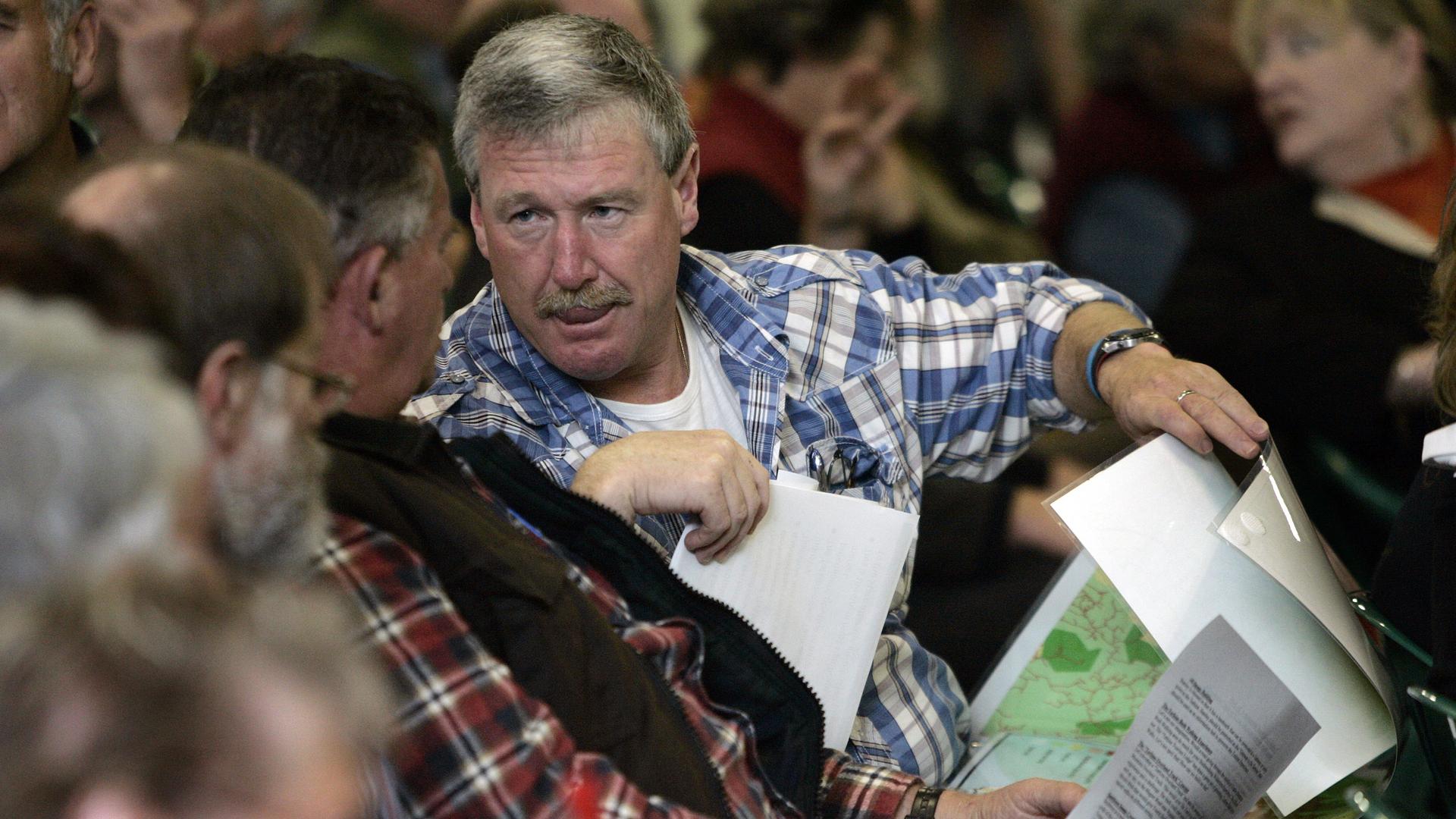
It feels a bit like a religious gathering, this convergence of like-minded people of all ages in the Queenstown Memorial Hall. “Shame! shame!,” they cry fervently, decrying not Satan but the Hodgman Liberal Government and, even more passionately, independent federal Denison MP Andrew Wilkie, who is clearly considered the greater of two evils.
It is the Saturday night of the two-day Labor conference and the hall has been turned into a dining room. The media are invited along and we reporters sit in silent bemusement while the party members do their raucous thing, stomping the ground and cheering as state president Senator Anne Urquhart gives her welcoming speech.
A ripple of uncertainty runs through the crowd when Urquhart refers to Green as leader of the opposition “at the moment”. Jaws drop and members look sideways at one another. “Awkward,” a woman mouths to her union colleagues.
But then Urquhart gets to the punch line: hopefully after the election, he will be premier! A collective sigh of relief. It was not a thinly veiled comment on Green’s leadership, after all.
I don’t think even Bryan Green would say he’s the best leader in the world, but he’s done a lot of hard work and I think he’s done a pretty damn good job – Community and Public Sector Union state secretary Tom Lynch
A local restaurant does a fine job catering for the event, but it is the post-dinner dancing that members are really waiting for. Failed Senate candidate John Short was a DJ in a previous life and he mans the decks, pumping out cheesy classics from Madonna, Bryan Adams and Bon Jovi.
A delegate from the union United Voice brings in a handful of vodka jelly shots while, on another table, cans of XXXX Gold start piling up. When asked what they would usually be doing on a Saturday night, one of the barmen, a volunteer from the Lions club, raises his eyebrows. “Nothing,” he says.
Green is hauled on to the dance floor by a Young Labor member. I think briefly about making a video of federal MP Julie Collins’ extraordinary dance moves, which would surely go viral on YouTube, but then I remember the oft-spoken rule: “What happens at conference stays at conference.”
9am Sunday at the Queenstown Memorial Hall. A cloud of cigarette smoke hangs about the entrance. The crowd is back, morning tea has been laid out and members are swapping battle stories from the night before. Turns out I missed a heroic dance-off between a couple of Labor staffers.
I track down former minister David O’Byrne to quiz him about the leadership rumours buzzing about all weekend. O’Byrne lost his seat in Franklin at the 2014 election and now works for the non-profit Beacon Foundation. Some Labor members hope sitting Franklin member Lara Giddings will stand aside, to make way for O’Byrne on a recount, thereby allowing a “smooth leadership transition” before the election campaign begins in earnest.
O’Byrne admits he is often approached. “It’s humbling that people think I did some good stuff and they’d like to see me back. You can’t help but be humbled by that,” he says. “But in every role I’ve had in my life I’ve given my heart and soul to it, and the work I’m doing at the Beacon Foundation really does inspire me to make a massive difference and that’s where my focus is at the moment.”
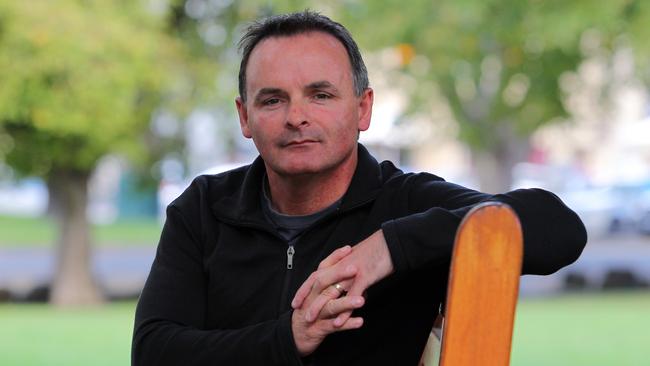
Green seems to think O’Byrne’s return to parliament is inevitable, but denies feeling threatened. “He [O’Byrne] is a very talented person and he, when he does come back in parliament, will make a fantastic contribution,” Green says. “But there’s no reason for him to knock me off. Why would he? I’m doing the job and I’m sure that we will work very well together.”
Community and Public Sector Union state secretary Tom Lynch dismisses the talk of O’Byrne’s return to parliament as “purely hypothetical” and “about as productive as calling for Jim Bacon’s return”.
“Of course there is leadership talk, but isn’t it the same of any team? Look at [Australian cricket captain] Steve Smith,” Lynch says. “I don’t think even Bryan Green would say he’s the best leader in the world, but he’s done a lot of hard work and I think he’s done a pretty damn good job.”
While Green seems determined to stare down any challengers, this is likely to become more difficult as the election nears, especially in light of today’s polling. His lacklustre Sunday morning speech at the conference does him no favours. “It had none of the hallmarks of an election-winning speech,” one senior delegate says.
When I interview Green he is yet to see the latest, dire poll results, but he points out it is not a presidential contest. He will not go to the polls solo but as a Labor team that includes young guns Rebecca White and Scott Bacon.
“The party has rights these days in terms of making leadership decisions and I’ll work as hard as I can to maintain the confidence of the Labor party and therefore go to the next election as the Labor leader,” Green says.
I ask how badly he wants to be premier. The question appears to catch him off guard. “I would just love to have the privilege to do it,” he finally says.
“And hopefully it would inspire other people who are working on the tools or out there working so-called normal jobs, that they can aspire to be leader of the Labor party or potentially the premier of Tasmania one day.”

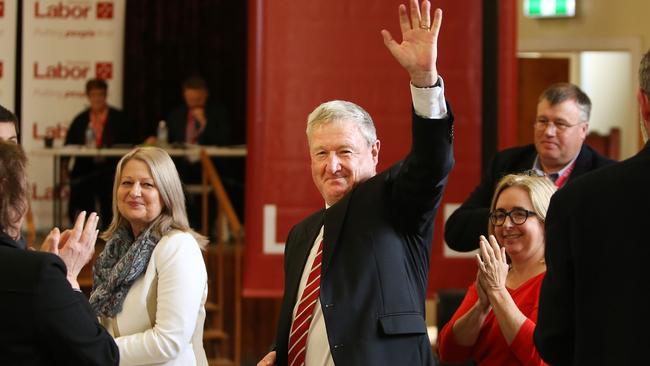
Hobart’s Incat scores third electric Nordic ferry deal
The electric revolution at Hobart shipbuilder Incat continues apace, with a fresh order from Scandinavian operator Molslinjen expanding the production line of next-generation ferries.
Crime scene declared at Eastern Shore home after death
The death of a woman, that Tasmania Police are treating as suspicious, has triggered a crime scene being declared at an Eastern Shore residence.